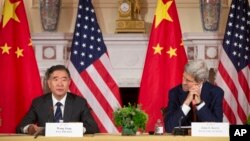The United States and China on Wednesday capped talks in Washington with promises to expand work on a range of key regional and global issues and to narrow differences on sensitive matters such as cyber security, China's claim on a disputed, strategic area in the South China Sea and human rights.
U.S. Secretary of State John Kerry called the 7th round of the Strategic and Economic Dialogue "productive" and "significant" in its breadth and depth while his Chinese counterpart, State Councilor Yang Jiechi, said "candid" talks led to "broad consensus."
Earlier at the White House, President Obama and members of China's Special Representatives agreed to further expand U.S.-China cooperation on climate and clean energy, and expressed agreement on climate negotiations to be held in Paris in December.
The White House said the U.S. president also expressed support for China's efforts to reform and rebalance its economy and for ongoing negotiations towards a bilateral investment treaty. But he also urged China to address its currency, technology and investment policies and to lower tensions resulting from its maritime actions.
President Obama also raised U.S. concerns about China's cyber activity, including the cyber theft of confidential business information and technology from U.S. companies. Washington is also investigating the massive hacking of sensitive personnel information belonging to millions of current and former U.S. government employees.
Secretary Kerry said the U.S. and China agreed during the dialogue to "work together to complete a complete code of conduct regarding cyber activities." He added Washington believes the U.S. and China should work together to develop and implement a shared understanding of "appropriate state behavior in cyberspace."
State Councilor Yang Jiechi said "China affirmed its firm opposition and crackdown on all forms of cyber hacking as well as China’s readiness for cooperation with the U.S. on cyber security on the basis of mutual respect, equality and mutual benefit." He also urged the U.S. to "respect facts."
The secretary of state raised China's human rights record and concern about pending legislation Kerry said might seriously hurt the work of non-government and civil society groups that focus on matters such as a stronger rule of law.
Yang responded, "It is important for the U.S. to respect China's sovereignty and territorial integrity... In advancing human rights, China's achievements are there for all to see."
The two sides agreed to continue to work toward denuclearization of the Korean Peninsula, completing P5+1 talks on Iran's nuclear activities, and deepening ties between the United States and the People's Republic of China, along with a range of other issues ranging from global health, military relations, environment and development issues.
The bilateral talks come ahead of a White House visit by Chinese President Xi Jinping in September.










